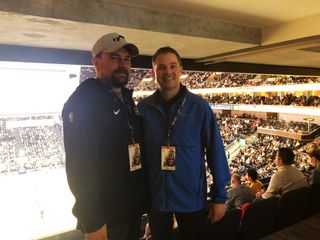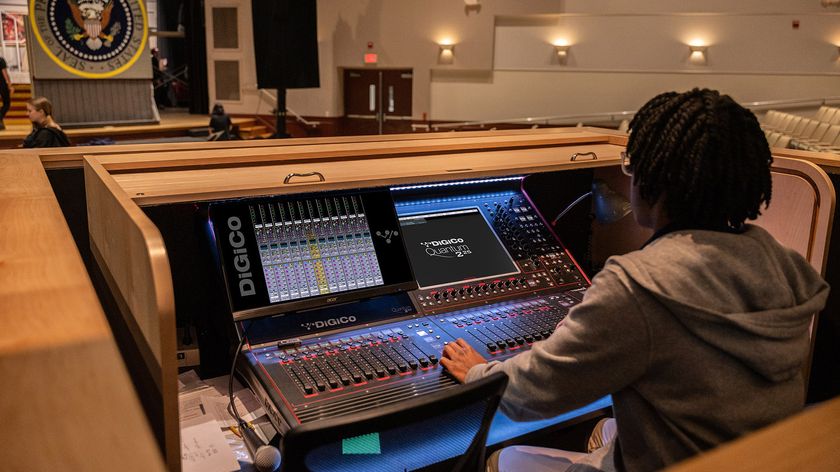Quick Bio
Name: Brian Fitzpatrick and Matthew Dopp
Position: President and CEO (Fitzpatrick) and Chief Marketing Officer (Dopp)
Company: Revel Media Group

On a tour of Revel digital signage installations with Samsung displays around Salt Lake City, Brian Fitzpatrick, president and CEO of Revel Media Group, shared the facts in his low-key way, while Matthew Dopp, the company’s chief marketing officer, bounced through each venue bubbling with backstories. We visited the Mountain America Credit Union (MACU) Hale Centre Theatre, a project that took home a Gold Apex Award in the Venues category at Digital Signage Expo in 2019, and the Vivint Smart Home Arena, home of professional basketball’s Utah Jazz and more than 600 networked signage displays.
I wondered how Fitzpatrick and Dopp started a company together that is now, nearly 10 years later, one of the largest digital signage content service providers in the industry. That evening we caught up in a luxury suite in the Vivint Smart Home Arena to watch the Utah Jazz and I learned the origins of this unlikely match.
The Simple Lesson
When the home automation company Fitzpatrick worked for went out of business in 2001, he started S3 Entertainment out of his basement with just $1,000. Soon a game-changing opportunity presented itself. “We worked on a multi-hundred-thousand-dollar installation for a high-profile customer, and we did everything we could to make sure we nailed it,” said Fitzpatrick.
By focusing on making complex systems easy to use, S3 became a home integration company of the jet set and Fortune 100. “A lot of these 10,000-square-foot homes get used two, three weeks a year. You can’t have an instruction manual for how to turn on the lights, or how to turn on the TV or raise the shades,” he said. “It has to be as simple as possible.”
In 2008, Fitzpatrick sold S3 Entertainment, but he kept up with the industry. Like many, he saw digital signage as the next big thing. “I stumbled on the business model that a lot of people tried, which was to put some screens in some places, sell some ads, and buy some Ferraris. That was the business model.”
One day, a friend of Fitzpatrick called and said, “‘I went to this restaurant, and there’s a screen in it that’s doing what you’re doing.’ I drove to the restaurant and looked, and sure enough it had a screen that was very similar to what I was doing. The display read, ‘To advertise here, call Matt [Dopp],’ and there was a phone number.”
Yin Meets Yang
Fitzpatrick called the number, and when Dopp answered, Fitzpatrick asked if the business was for sale. At the time, Dopp was selling residential and commercial real estate successfully, even during a recession. Dopp didn’t want to sell the business—he was using the digital displays to advertise his homes for sale—but he did want to do something different.
“I recognized that Matt was one of those one-in-a-million salespeople who can build a relationship with somebody instantly, and people buy from him because they like him. He becomes their friend and it’s genuine. It’s not fake,” Fitzpatrick said.
[Networking and Connecting People, Not Computers]
Fitzpatrick suggested they team up. They discovered that their business plans were essentially the same, so the duo moved forward with a partnership and changed the name to Revel.
“Shortly after, we had an opportunity to create an advertising network in all of the Utah high schools. There’s about 50 of them. We placed screens in every high school, and we sold ads to the military, cellphone companies, tuxedo shops, colleges, anything to do with that 15- to 18-year-old demographic,” Fitzpatrick recalled.
A Better Secret Sauce
When the duo discovered that the attrition rate of advertisers hovered around 97 percent, they changed the way they did business. “What people like about us is having a screen for their own information. What doesn’t work is selling ads to third-party companies and chasing that revenue. So we shifted our business to specialize in helping small businesses and schools get their messages on the screen,” Fitzpatrick explained. “We looked at different CMS providers and found they were way too complicated for a basic user to manage content.”
Fitzpatrick and Dopp saw an opportunity. No one provided simple end user tools that integrated with multiple content management software systems to deliver content across different technologies, whether it’s outdoor LEDs, kiosks, menu boards, point of purchase boards, or corporate communication signs.
[Coming Together: How Integrators and Content Creators Can Make It Work]
And then Revel’s software tool—Channel Valet—was born. “The first version of Channel Valet was literally just ‘tell us what you want, and we’ll build the content and put it on the screen.’” Fitzpatrick said. “We got pulled into bigger opportunities with banks that had 30 to 100 branches, convenience stores that had a few hundred locations, and large Fortune 500 companies that had four or five call centers where they needed employee messaging.”
Content Really Is King
Revel’s dynamic duo noticed that every company, regardless of size, faced the same challenges with digital signage: producing content.
“Nine times out of 10, the user wants their message on the screen, and has no idea how to get their content on it,” Fitzpatrick said. “The content should be the most important thing, and the technology should take a backseat. It turned out that content was what a lot of people were looking for.”
Service Matters
Revel doesn’t see itself as a digital signage company or as an AV integrator, but as more of a service provider. “We’re a communication company,” said Fitzpatrick. “Our goal is to help people communicate their message. We just happen to use digital signage and AV technology as our primary media.”
Currently, about 40 percent of Revel’s business constitutes services, while 60 percent is hardware and installs. “We have a goal that within the next five years, less than 20 percent of our business will come from hardware,” said Fitzpatrick.
Yin + Yang
Revel found a niche in producing content for digital signage, and the two business partners use their own specialties to complement each other. “What Matt is really passionate about and really, really good at are the things that I’m either not good at or not passionate about. And vice versa,” Fitzpatrick said.
Content management was a great idea, for sure, but the human element also breeds Revel’s success.













